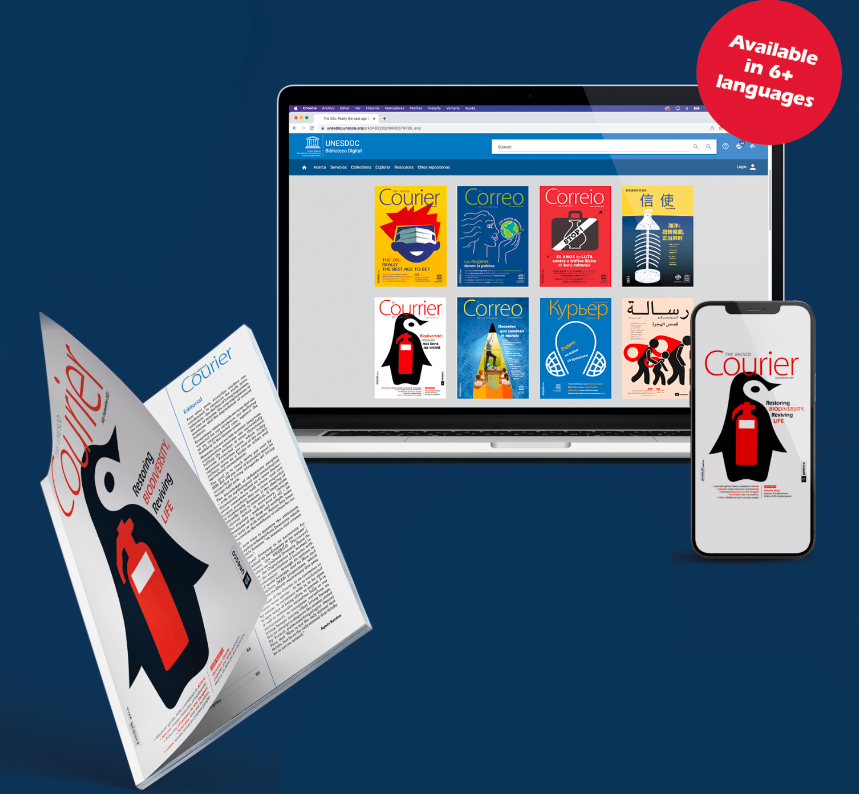مقال
هل تنقّل الأدمغة الأفريقية خيار أفضل من الهجرة؟

في أكتوبر 2016، أثار تقرير لصندوق النقد الدولي ضجّة إعلامية: جاء فيه أن «عدد المهاجرين أصيلي جنوب الصحراء الإفريقية إلى دول منظمة التعاون الاقتصادي والتنمية، الذي بلغ 7 ملايين عام 2013، قد يبلغ 34 مليونا عام 2050». وأكّد التقرير على أن «هجرة العمال الشبان والمتعلّمين تضرّ أيّما ضرر بمنطقة تُعاني أصلا من ندرة رأس المال البشري». ولا فائدة في استعمال القوّة لإيقاف هذا النزيف الذي ينخر القارّة منذ عقود. بل يجب إدماج المسار المُتّبع في الخارج صلب المناهج الجامعية الإفريقية، وتشجيع الهجرة قصيرة الأمد التي تسمح بعودة الأدمغة إلى بلدانها الأصلية.
لوك نغواي
جاء في تقرير لصندوق النقد الدولي يحمل عنوان آفاق الاقتصاد العالمي (أكتوبر2016) أن «هجرة الأدمغة أمر جسيم وخاصة في ما يتعلق بجنوب الصحراء الإفريقية» وأن «هجرة العمّال الشبان المتعلمين يضرّ أيّما ضرر بمنطقة تُعاني أصلا من ندرة رأس المال البشري. كما أن الفئة المتعلّمة من المهاجرين أصيلي المنطقة تُعدّ أكثر كثافة بالمقارنة مع المهاجرين المتعلمين الآتين من الدول النامية الأخرى. علما وأن هجرة العاملين المُؤهّلين تأهيلا عاليا هي مُكلفة جدا على الصعيد الاجتماعي والدليل على ذلك ما انجر عن مغادرة أطباء ومُمرّضات من مالاوي وزمبابواي، من فقدان لرَفاهة العيش إلى جانب الخسائر على الصعيد الاقتصادي البحت». هذا الوضع ليس بالجديد إذ أن هجرة الأدمغة الإفريقية بدأت منذ سنوات 1980.
هجرة مُؤقّتة في الستّينات
غداة فترة الاستقلال، خلال الستينات والسبعينات، كانت تهدف سياسات التعليم العالي في إفريقيا إلى تكوين النُخب الخاصّة بها استجابة لحاجيات الدول في طور البناء. وقد تلقى جزء من هذه النخب تعليمه في الخارج، وبالخصوص في غداة فترة الاستقلال، خلال الستينات والسبعينات، كانت تهدف سياسات التعليم العالي في إفريقيا إلى تكوين النُخب الخاصّة بها استجابة لحاجيات الدول في طور البناء. وقد تلقى جزء من هذه النخب تعليمه في الخارج، وبالخصوص في الدول المُستعمِرة السابقة أو في الكتلة السوفياتية. وكان الطلبة يتمتعون بمنحٍ من الدولة ومُطالبين بالعودة إلى بلدانهم للمساهمة في إنمائها. في الكاميرون، على سبيل المثال، كان يفرض التزاما عشريا على كافة المتمتّعين بالمِنح. أما دول الكتلة السوفياتية، فكانت تفرض مغادرة الطلبة الأفارقة فور انتهائهم من الدراسة. وفي غيرها من الدول، يكتسي التشجيع على المغادرة صيغ أخرى: صعوبات في الاندماج المهني، مواطن شغل محجوزة، سياسات التفرقة، التمييز في الدرجات، الخ. في المقابل، كانت الدول المستقلّة حديثا تمنح مناصب جذّابة لأبنائها الحاصلين على الشهادات العليا، معتمدة باستمرار على إذكاء حماسهم للاستقلال وشعورهم بالجدوى، وذلك في شكل شعارات تمجّد دورهم مثل: البلاد في حاجة لكم! خلال العشريتين التي تلت حصول الدول على استقلالها، كان تنقّل الأدمغة الإفريقية يندرج في حركة الهجرة الواسعة ذات الصبغة المؤقتة، على الأقل من حيث النوايا.
الهجرة كأفق للحياة في الثمانينات
ولكن خلال السنوات 1980 و1990، في أغلب الدول الإفريقية، تضاءلت نشوة فترات الاستقلال ليحل محلها شعور بخيبة الأمل. لم يتمّ الإيفاء بالوعود بالخروج من الفقر. واضطرت أجهزة الدولة على القيام بحملات متتالية لـ«ضبط النفس» من خلال تقليص الانتدابات. فإذا بحلم مشروع الصالح العام المشترك يتبخّر، ليستقرّ الاحساس بعدم الجدوى. وتغيّر بالتالي معنى الحصول على الشهادات، خاصّة وأن «إمكانية التشغيل» أصبحت في مقدمة الأولويات في السياسات التربوية، سواء كان ذلك في إفريقيا أو خارجها. وأصبح الطلبة يتّجهون نحو التكوين الذي يسمح لهم بالحصول على مهارات تؤهلهم لاقتحام السوق العالمية للشغل.
والحال أن هجرة الكفاءات الآتية من دول الجنوب لم تكن لتزعج دول الشمال التي أصبحت تتسابق في سبيل استمالة المواهب وتجهد في إيجاد الحلول لتجديد القوى العاملة. إن التشيّخ الديمغرافي المرتقب، وكذلك بعض سياسات الحدّ من التكوين، على غرار نوميروس كلوسوس بالنسبة للأطبّاء في فرنسا، أجبر هذه الدول على الإلتجاء أكثر فأكثر إلى اليد العاملة الأجنبية. وهي تتبنّى سياسة انتقائية للهجرة تعمل بمقتضاها على ملاءمة خصوصيات المهاجرين مع حاجيات اقتصادها. وأمام افتقارها للكفاءات في المجال الطبي، تستقبل فرنسا الأطباء الأجانب، في حين تجلب ألمانيا الأجانب من ذوي الكفاءات المتطابقة مع متطلبات القطاع الصناعي.
إن الاختصاصات المهنية في مجالات الصحة والإعلامية والمالية والتكنولوجيا من شأنها أن تيسّر، أكثر من غيرها، إمكانية التنقّل على الصعيد الدولي. وهذا يعني أن العولمة تمحي تدريجيا الحواجز القائمة بين الأسواق الوطنية والأسواق العالمية للشغل، وهذه الديناميكية الاقتصادية تُساعد على توحيد معايير المناهج الجامعية والشهادات على الصعيد العالمي.
وإن تمكنت الدول الإفريقية من اقتحام العولمة «خلسة» باعتبار أن ليس لها دائما القدرة على فرض وجهة نظرها، فإن الأمر يختلف بالنسبة للأفراد. هؤلاء ينجحون أحيانا في الاستفادة من العولمة من خلال المشاريع التربوية التي يُطوّرونها، وعبر آفاق مهنية وإمكانيات أخرى متاحة (استهلاك، سفر، الخ). إلا أن هذه الحالات المرتبطة بالرفاهية الشخصية لا تتوافق بالضرورة مع الأهداف الشاملة للدول الأفريقية، ولا مع توجّهاتها ولا أولوياتها.
ومهما يكن من أمر، فإن السياسات الداخلية للدول الأفريقية تُمثّل أحد العوامل التي حوّلت هجرة الأفارقة المُؤقّتة إلى هجرة دائمة، بالنظر إلى المعادلة الديموغرافية لدول الشمال ومقتضيات العولمة. فغابت الآفاق الحقيقية للهجرة وزالت نيّة العودة، والسبب في ذلك، كما أسلفنا، لا يعود فحسب إلى العوامل الاقتصادية (الشغل، الراتب، ظروف العمل) أو السياسية (الاضطهاد، انعدام الأمن)، بل أصبحت الهجرة هدفا في حد ذاتها.
قدرات كامنة في الشتات المعاصر
يبدو أن الدول الأفريقية غير قادرة في الوقت الراهن على إيقاف هجرة الأدمغة. وسوف تبقى الاستراتيجيات المُعتمدة لإعادة المهاجرين إلى الوطن غير مُجدية، طالما لم تُعالج الحكومات الأسباب العميقة للهجرة، و طالما لم تُعط الأولوية لجلب الأدمغة التي غادرت الوطن.
هناك خيار آخر – وقد يكون الحل – يتمثّل في إدماج الأدمغة المهاجرة في المناهج الجامعية للدول الأفريقية. من شأن هذا التداول للكفاءات أن يفتح آفاقا جديدة في عصر العولمة الذي لا يمكن للدول الإفريقية أن تتجاهله.
منذ عدّة سنوات، تكوّنت شبكات جامعية وعلمية بين الدول الأصلية للشتات الإفريقي والدول التي يقيم فيها، كما هو الحال بالنسبة لجامعة «مونتاني» في الكاميرون التي أقامت علاقات مع المركز الاستشفائي الجامعي بديجون وجامعة باريس XIII في فرنسا، وكذلك مع جامعة أودين ومركز طب القلب بميلانو في إيطاليا. ووضع المغرب برامج وطنية لتجنيد الأدمغة المهاجرة، مثل المنتدى الدولي للكفاءات المغربية في الخارج.
وفي هذه البرامج دعم للجهود الوطنية في البحث العلمي والتكنولوجي. وفي سنة 2009، عقد المركز الوطني للبحث العلمي والتقني بالرباط اتفاقيات مع هياكل مختلفة بالخارج، وخاصة منها جمعية الأخصّائيين المغاربة في الإعلامية بفرنسا وشبكة الكفاءات المغربية بألمانيا.
ويستفيد مجال الصحة أيضا من هذا التعاون. وقد ربط الصيادلة الكاميرونيون المستقرون في بلجيكا علاقات مع جامعة دوالا ليُعطوا دروسا في المستحضرات الصيدلانية. كما تُنظّم جمعية الأطباء الكاميرونيين ببلجيكا منذ عام 2010 ملتقيات مهنية وحملات إعلامية تحسيسية ووقائية لفائدة أهالي الكاميرون.
التداول، نمط جديد للهجرة
هذا ويفضّل البعض من دول الشمال «التنقل المتداول»، أي الهجرة قصيرة الأمد التي تُمكّن الأجانب من العمل ومن التخصّص لفترة محدودة قبل العودة إلى بلدانهم. في ألمانيا، يحظى هذا «التنقل المتداول» بدعم من المُؤسسة الألمانية للاندماج والهجرة، وكذلك من الوكالة الألمانية للتعاون الدولي، تحت اسم تريبل واين، والوكالة الفدرالية للشغل، ويعود بالفائدة على الدول الأصلية ودولة الاستقبال على حد السواء، بفضل نقل المهارات والمعارف. أما المعني بالأمر الأساسي، فهو يستفيد من التكوين خلال الممارسة المهنية، ويربط علاقات مهنية نافعة، ويتمتّع بحياة أفضل خلال إقامته في الخارج مع امكانية استثمار مدّخراته في ما بعد في بلده الأصلي.
ونجد في الميدان الجامعي مثل هذه الممارسات التي تضمن الانتفاع المشترك بين الدول الأصلية ودول الاستقبال، خاصة في الولايات المتحدة وكندا، وبنسبة أقل في المملكة المتحدة وفرنسا، حيث يشرف الجامعيّون الأفارقة الذين يعملون في مؤسسات التعليم العالي والبحث في هذه الدول، على برامج للتعاون في بلدانهم الأصلية، بمساندة من تلك المؤسسات. ومنهم محمود ممداني الذي أنشأ سنة 2010 معهد البحوث الاجتماعية بجامعة ماكيرار (أوغندا) بعد انتهاء مهمته كمدير لمعهد الدراسات الإفريقية بجامعة كولومبيا في نيويورك (الولايات المتحدة)، وكذلك عصمان كان، صاحب كرسي «الإسلام والمجتمعات المسلمة المعاصرة» بجامعة هارفارد في بوسطن (الولايات المتحدة) الذي بعث سنة 2016 برنامجا للتبادل الجامعي ينتفع منه الطلبة في السنغال، بلده الأصلي. وتطول قائمة الباحثين والجامعيين الأفارقة الذين ساهموا في تجديد التعليم العالي والبحث في بلدانهم الأصلية بفضل برامج التعليم والبحث ومشاريع النشر المشترك.
إن إدماج المهاجرين الأفارقة في سوق الكفاءات العالمية يضمن لهم تنمية قدراتهم التنافسية ويحفظهم من الجمود الذي قد يلحقهم لو بقوا في بلدانهم الأصلية نظرا لظروف العمل السيئة والمحيط غير الملائم للتألّق المهني. وهذا صحيح بالنسبة للأساتذة-الباحثين والعاملين في مجال الصحة، وبالأخص في ما يتعلق بالمهن الحديثة مثل الإعلامية، والاتصالات، والمالية أو التكنولوجيات الحيوية.
وأبرز تقرير صندوق النقد الدولي أن الأدمغة الإفريقية المهاجرة «يمكن لها أيضا اقتراح برامج دقيقة لإعادة التأهيل المهني وتكوين الإطارات. وحين تتظافر الكفاءة والعلاقات والخبرة مع الإلمام بالآفاق العالمية والتقاليد المحلية، فإن شتات المهاجرين بوسعه أن يُساهم في تدعيم المحيط الاقتصادي في بلاده الأصلية، وفي تحسين نجاعة مشاريعها وتعزيز موقعها في الأسواق الجديدة».
وإذا بذلنا الجهد اللازم لتحويل تسرّب الأدمغة إلى ىتنقّل الأدمغة، فسنكون قد فتحنا الطريق أمام سبل جديدة للتعاون، وطرق جديدة للتنمية في الدول الأفريقية ووسائل جديدة للتأثير تستمدّ قوتها من التنشئة الاجتماعية الدولية.
By Luc Ngwé
“Brain drain is particularly acute in sub-Saharan Africa,” says the World Economic Outlook (October 2016), a report published by the International Monetary Fund (IMF). “The migration of young and educated workers takes a large toll on a region whose human capital is already scarce. The concentration of migrants among those who are educated is higher than in other developing economies. The migration of highly-skilled workers entails a high social cost, as is evidenced by the departure of doctors and nurses from Malawi and Zimbabwe, which may mean welfare losses beyond those that are purely economic.”
This situation is not new. The African brain drain had already started in the 1980s.
Temporary migration in the 1960s
In the 1960s, the higher education policies of newly independent African states reflected a need for them to train their own elites. For some, students would be trained abroad, mostly in the former colonizing countries and the Soviet Union. They received state scholarships and were expected to return home to contribute to their country’s development. Cameroon, for example, required that all students with scholarships sign a ten-year pledge. Meanwhile, countries in the former Soviet bloc demanded that African students leave as soon as they had finished their studies. They were also encouraged to leave the host countries due to other factors – such as difficulties in finding employment, jobs reserved for nationals, discrimination or downgraded appointments. At the same time, newly independent states offered attractive job prospects for their graduates – reviving their enthusiasm for independence and using laudatory slogans like “Your Country Needs You!” to make them feel wanted.
In the two decades after independence, the African brain drain followed the logic of a wider migration movement. Its main feature was that it was temporary – at least in its intention.
In the 1980s, this post-independence euphoria gave way to disenchantment in most African countries. Promises of an escape from poverty were not kept. In a series of successive self-imposed “slimming diets”, the state apparatus drastically cut back on public-sector recruitment. The ideal of a project for the common good began to fade, and a feeling of futility set in. Getting a diploma no longer had the same meaning, while “employability” became the watchword for educational policy, in Africa and elsewhere. Students increasingly turned towards courses that enabled them to acquire skills that were “saleable” in the world job market.
Migration for life
Countries in the North were not unhappy about the migration of skills out of countries in the South, though. They competed for new talent while facing problems in renewing their own workforces. Forecasts of an ageing population and certain policies limiting the number of student places, like the numerus clausus for medical students in France, forced these countries to increasingly turn to foreign labour. They adopted selective immigration policies in an effort to match the skill sets of migrants to the needs of their economies. Faced with a dearth of doctors, France welcomed those from abroad, while Germany attracted foreigners with the skills their industries needed.
The health professions, computing, finance and technology, in particular, led the way for greater international mobility. In this sense, globalization gradually opened up national job markets, while encouraging greater standardization in curricula and diplomas worldwide.
But, while African countries entered this globalization through the backdoor, in that they did not always have a say in it, the same was not true for individuals. They sometimes benefited through personal educational projects, professional prospects and other possibilities (consumption, travel, etc.) on offer to them. However, while these opportunities may have matched personal development goals, they did not necessarily correspond to the development goals, orientations and priorities of some African countries.
Be that as it may, the internal policies of African countries are among the factors that – alongside the demographic trends of countries of the North, and globalization – transformed African migration from being temporary to being permanent. This was migration with no real prospect or intention of returning, and which was not due, as we have just seen, to economic factors alone (jobs, salaries, working conditions) or policies (persecution, insecurity). It was migration as a prospect for life.
Brain power in the diaspora
Today, African countries seem to find it impossible to stop the brain drain. Repatriation strategies at any price are proving to be ineffective, so long as governments do not attack the root causes of emigration. And that priority is not given to retaining brains that are fleeing.
One alternative – if not a solution – would be to use the brain power in the diaspora to teach courses in African universities. Such a circulation of skills would open new prospects for African countries at a time of inescapable globalization.
For several years now, university and scientific networks have been set up between home countries and countries with an African diaspora. There is, for example, the University of the Mountains in Cameroon, which has formed an alliance with the Dijon University Hospital and the Paris 13 University in France – and with the University of Udine and the Centro Cardiologico Monzino in Milan, both in Italy.
Morocco is involving its diaspora through national programmes such as the International Forum of Moroccan Competencies Abroad, which supports national research and technology initiatives. In 2009, the National Centre for Scientific and Technical Research (CNRST) in Rabat signed memoranda of understanding with a number of bodies abroad, notably the Association of Moroccan Computer Scientists in France (AIMAF) and the Moroccan-German Skills Network (DMK) in Germany.
Health is an area that would benefit from this kind of cooperation. Cameroonian pharmacists who have settled in Belgium have joined forces with the University of Douala to offer introductory courses in pharmacy. Since 2010, the Association of Cameroonian Physicians in Belgium (MedCamBel) has been organizing professional conferences and public information, prevention and awareness-raising campaigns for Cameroonians.
Circular migration – a new trend
In parallel, certain countries in the North are encouraging “circular mobility”, or short-term migration, which enables foreigners to work and to specialize in their vocations for a few years, before returning to their country of origin. This circular migration is supported by the Expert Council of German Foundations on Integration and Migration, the German Agency for International Cooperation (GIZ), under its Triple Win programme, and Germany’s Federal Employment Agency.
Circular migration benefits both the country of origin as well as the host country, through the transfer of skills and knowledge. And we shouldn’t forget the subjects of all of these initiatives – who are learning by working, who form professional links that might prove useful, and who can earn a better living during their stay abroad, which they can then invest in the economy of their countries of origin someday.
Similar mutually beneficial practices between host country and country of origin operate in the academic world, especially in the United States and Canada, and to a lesser extent, in the United Kingdom and France. African universities with links to higher education and research institutions in these countries are piloting a programme of cooperation with their country of origin, supported by these overseas institutions. In 2010, Mahmood Mamdani, who was director of the Institute for African Studies at Columbia University, New York (from 1999 to 2004), created the Makerere Institute of Social Research at the Makerere University in Uganda. In 2016, Ousmane Kane, who holds the Chair of Contemporary Islamic Religion and Society at the Harvard Divinity School in the US, started an academic exchange programme for students from Senegal, his country of birth. There is a long list of African researchers and academics who are helping to regenerate higher education and research in their countries of origin, through teaching and research programmes and co-publication projects.
The integration of the African diaspora in the global skills market offers them some assurance that they will remain competitive, instead of experiencing the sclerosis they suffer if they stay in their country of origin – because of the poor working conditions and an environment that does not favour professional success. This is particularly the case for lecturers, researchers, health personnel, and more recently, the so-called cutting-edge professions like Information Technology (IT), telecommunications, finance and biotechnology.
As the IMF report points out, African diaspora networks “can also provide rigorous professional development and leadership training programmes. Combining their skills, contacts, and know-how with their insight into global opportunities and local customs, diaspora networks of emigrants may help strengthen the home-country business environment, raise efficiency, and expand into new markets.”
When we make the effort to transform the brain drain into brain circulation, it can pave the way for new forms of cooperation, new modes of development for African countries and new forms of influence that can draw strength from international socialization.
Luc Ngwé
Luc Ngwé is a Cameroonian researcher and freelance consultant. The author of a series of studies on higher education, he has taught at the University of Douala (Cameroon), and at universities in Nanterre and Avignon (France).

In the same issue






